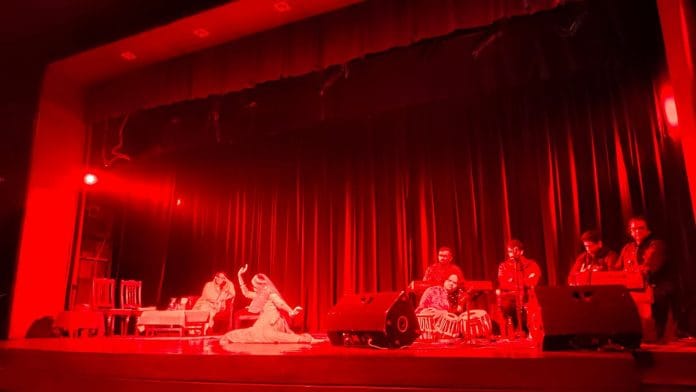New Delhi: In her final moments, Meena Kumari confesses she isn’t fond of films. She reads from her diary of poems and longs for friends estranged due to her addiction. In the play where this happens, Gulzar is away on a film shoot and Dharmendra hasn’t visited her for some time, despite being called often. Utterly alone, she abhors dying from a prosaic illness.
“Liver cirrhosis—what a weird name! Look at Urdu’s dard-e-jigar…aaye haye haye, you hear it and think, if death were to come, it’d rather be from this!”
New Delhi’s LTG Auditorium was jam-packed on 5 January, with middle-aged and older people making up most of the audience. Many of them had long been fans of Meena Kumari, while some only knew her from Pakeezah (1972). All of them had high expectations from Chalte Chalte, a dance-drama by theatre group Pierrot’s Troupe.
Written and directed by M Sayeed Alam, the show was produced by Bazm-e-Urdu, a Dubai-based organisation that’s promoting the language through live performances around the world.
“A very important aspect of Meena Kumari is her shayari, through which she could express herself. So, we at Bazm-e-Urdu wanted to highlight this aspect of her, that a lot of people don’t know. It was so dear to her heart and is dear to ours too,” said activist and scholar Rehan Khan, who conceptualised the play.
Khan wanted the show to combine drama, singing, and dance—a fitting celebration of the poet-actor’s life.
Actor Tarannum Ahmed performed a solo act as Meena Kumari on the left side of the stage. On the right, a five-member band led by singer Mehran Shah performed semi-classical renditions of ghazals written by the actor, most of which hadn’t ever been sung before. The centre stage was reserved for Kathak dancer Astha Gupta’s semi-classical spin on the tragedy queen’s hit dance numbers.
The result was a lonely Meena Kumari with only her poetry for company, visited time and again by the spectre of her film persona.
A study in stillness
Mehran Shah and Astha Gupta were allowed to give their own twist to Meena Kumari’s body of work – to uniquely engage with it and not indulge in mere mimicry. While this opportunity worked wonderfully for Shah’s ghazals, it posed a problem for Gupta’s dance pieces, especially since she represented Meena Kumari’s on-screen persona. The legendary actor’s dance is a study in stillness—the opposite of Gupta’s boundless energy.
Tarannum Ahmed, too, struggled to find Meena Kumari in her performance.
“There is rare visual reference for Meena Kumari as Mahjabeen—only her as an actress, portraying her tragic characters,” said Ahmed. “How to present a part of her no one saw was the challenge. In a way, it was also easy because, in the absence of a reference, I could make it my own.”
Lawyer PV Kapoor, an attendee, saw no such problems. “The actress who played Meena Kumari was fantastic,” he said.
There were some brilliant moments in the show. Ahmed kept the little finger of her left hand folded. She often toyed with her dupatta or used her right hand to hide it – just as Meena Kumari had done in all her films after 1951 to conceal the finger she broke in an accident. When Gupta took centre stage performing Thare Rahiyo O Banke Yaar, enacting the application of kohl, Ahmed was busy fixing her own kajal behind her. And Shah’s soulful rendition of Abdul Ghafoor Nassakh’s ghazal, Zahira Maut Hai, could find a place right beside Chand Tanha, immortalised by Meena Kumari in her 1971 album, I Write, I Recite.
Also read:
‘All stones fell to my lot’
In the play, Meena Kumari’s great love affair wasn’t with Kamal Amrohi, but with Urdu and Shayari.
“People think that I have become afflicted with shayari and sharab [liquor] out of a conflict with my husband,” she says to an invisible listener, Chandan, in one scene. “Only the second part of this is true. Shayari I began to write in the prime of my youth.”
Forced to work as a child actor in films to support her family, Meena Kumari wasn’t allowed to study. Nevertheless, she was taught to read and write, and found her way to poetry, where she discovered dreams of romance and liberation from her father’s control. She sought to achieve both by marrying Kamal Amrohi, but the lover became just as much of a stifling presence.
The producer attempted to control her schedule, her friendships, and even those who could enter her makeup room. The dream shattered.
“Tukday tukday din beeta, dhajji dhajji raat mili [The day passed in pieces, the night in patches],” Ahmed recited on stage, capturing the tragedy in Kumari’s life.
An acclaimed actor who reached the heights of success, Meena Kumari chafed at patriarchy’s hold on her life. Her only sources of comfort were the friendships she built with the likes of Gulzar and Dharmendra.
“If we disregard the gossip, Meena Kumari liked men. She wanted to be with them, talk to them,” said M Sayeed Alam. “She got an appreciation for her shayari from Gulzar and Dharmendra, and a kind of support that neither her father nor husband had given her.”
The play ends with the actor bequeathing her poems to Gulzar—not Amrohi. Her last words, however, are for her husband. She asks that her grave not be made of marble like Mumtaz Mahal’s, but simply covered with small, round stones.
“All the world’s stones fell to my lot and I gathered them all. They’re the sum of my life.”
(Edited by Zoya Bhatti)






